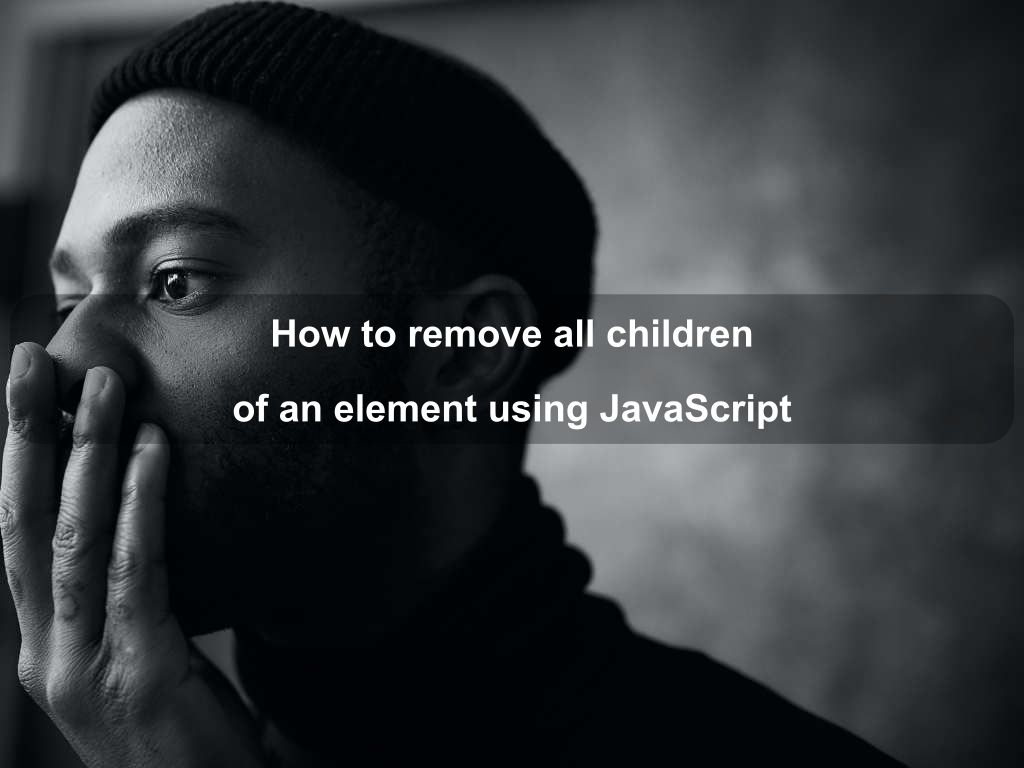published: 31 May 2022
2 min read
How to remove all children of an element using JavaScript
To remove all child nodes of an element, you can use the element's removeChild() method along with the lastChild property.
The removeChild() method removes the given node from the specified element. It returns the removed node as a Node object, or null if the node is no longer available.
Here is an example code snippet:
const removeChilds = (parent) => {
while (parent.lastChild) {
parent.removeChild(parent.lastChild);
}
};
// select target target
const body = document.querySelector('body');
// remove all child nodes
removeChilds(body);
The removeChilds() method does the following:
- Select the last child node by using the
lastChildproperty, and removes it by using theremoveChild()method. Once the last child node is removed, the second last node automatically becomes the last child node. - Repeat the first step until there is no child node left.
The removed child node returned by the
removeChild()method is no longer part of DOM. However, you can insert it back to the DOM if required.
What about innerHTML and textContent?
You could also use the innerHTML property to remove all child nodes:
// select target target
const body = document.querySelector('body');
// remove all child nodes
body.innerHTML = '';
This approach is simple, but it may not be a suitable choice for high-performance applications because it invokes the browser's HTML parser to parse the new string and update the DOM.
If you don't want to invoke HTML parser, use the textContent property instead:
body.textContent = '';
According to MDN, the textContent property performs better than innerHTML as the browser doesn't have to invoke the HTML parser and can immediately replace all child nodes of the element with a single text node.

Are we missing something? Help us improve this article. Reach out to us.
How to remove all children of an element using JavaScript
To remove all child nodes of an element, you can use the element's removeChild() method along with the lastChild property.
The removeChild() method removes the given node from the specified element. It returns the removed node as a Node object, or null if the node is no longer available.
Here is an example code snippet:
const removeChilds = (parent) => {
while (parent.lastChild) {
parent.removeChild(parent.lastChild);
}
};
// select target target
const body = document.querySelector('body');
// remove all child nodes
removeChilds(body);
The removeChilds() method does the following:
- Select the last child node by using the
lastChildproperty, and removes it by using theremoveChild()method. Once the last child node is removed, the second last node automatically becomes the last child node. - Repeat the first step until there is no child node left.
The removed child node returned by the
removeChild()method is no longer part of DOM. However, you can insert it back to the DOM if required.
What about innerHTML and textContent?
You could also use the innerHTML property to remove all child nodes:
// select target target
const body = document.querySelector('body');
// remove all child nodes
body.innerHTML = '';
This approach is simple, but it may not be a suitable choice for high-performance applications because it invokes the browser's HTML parser to parse the new string and update the DOM.
If you don't want to invoke HTML parser, use the textContent property instead:
body.textContent = '';
According to MDN, the textContent property performs better than innerHTML as the browser doesn't have to invoke the HTML parser and can immediately replace all child nodes of the element with a single text node.
Are you looking for other code tips?
JS Nooby
Javascript connoisseur





